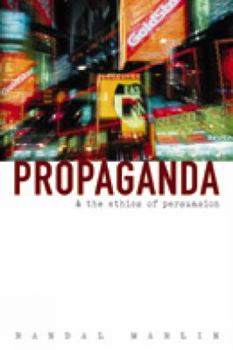< Back to Search Results
Propaganda and the Ethics of Persuasion
Select Format
Select Condition 
Book Overview
This book develops a sophisticated account of propaganda and its intriguing history. It begins with a brief overview of Western propaganda, including Ancient Greek theories of rhetoric, and traces... This description may be from another edition of this product.
Format:Paperback
Language:English
ISBN:1551113767
ISBN13:9781551113760
Release Date:August 2002
Publisher:Broadview Press
Length:328 Pages
Weight:1.02 lbs.
Dimensions:9.0" x 0.7" x 6.0"
Customer Reviews
1 rating
Very Important Book!
Published by Thriftbooks.com User , 20 years ago
If America wishes to maintain a representative democracy, the information in this book is essential. All Americans have the liberty to make choices and the freedom to pursue happiness. But the very "happiness" and "freedom" that we seek to protect is often used to package and fuel propaganda. Ideas, like "the Patriot Act" may have an inherently enormous emotional appeal. They promise security, support our personal desires and even make us feel more like a member of a vast majority; ideas like this, however, have the ability to limit our freedom and our pursuit of happiness by harboring or promoting false agendas. In many ways, small influential groups have the ability to use propaganda to affect the beliefs or actions of majorities. Therefore, an understanding of propaganda is crucial if Americans wish to avoid tyrannous control of their government and restriction of their personal freedom. Randal Marlin defines "propaganda" as "the organized attempt through communication to affect belief or action or inculcate attitudes in a large audience in ways that circumvent or suppress an individual's adequately informed, rational, reflective judgment" (22). It is critical to recognize that Marlin's definition supports the idea that the individual or group generating the propaganda creates a situation wherein its recipients are receptive to falsehoods. It is also important to recognize that within this definition, propaganda happens within information. I personally tend to believe that the reception of propaganda involves negotiation, and that the recipients of propaganda are not passive. From this perspective, it is the impairment of people's ability to negotiate that I find easier to examine than the propaganda itself. By understanding some of the techniques used in propaganda that inhibit this negotiation process, we can increase our ability to identify, dissect, and disarm them. I believe that Marlin's book educates its readers, thereby making them informed participants in this negotiation process. Propaganda requires the attention of its target audience; without this attention, seduction opportunities cannot occur. Furthermore, there exists an overwhelmingly vast array of possible contexts and complementary channels that give rise and support to such seduction opportunities. Marlin says that "in a free society, the right of a person to choose what messages to see and hear will place limits on the right of others to communicate with him or her" (97). I agree with Marlin's statement generally, and recognize the tremendous skill that propagandists must use to choose complementary channels that support their efforts, all while holding the attention of their target audiences and supporting those audiences' interests. I also recognize the concentration of capital in American mass media industries (Marlin 253-255, 262, 283) as a frightening advancement in the efficiency of these processes. The deregulation of American mass media industries have created a





